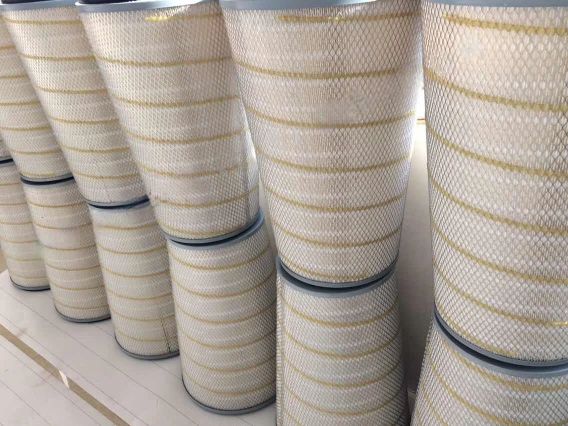 Tel:
+8615930870079
Tel:
+8615930870079
12月 . 26, 2024 09:15 Back to list
Innovative Cartridge Vacuum Filter Solutions for Efficient Liquid Filtration and Separation
Understanding Cartridge Vacuum Filters A Comprehensive Overview
Cartridge vacuum filters are widely utilized in various industries for their efficiency in separating solid materials from liquids. These filters leverage a vacuum-assisted process to speed up filtration, making them essential in applications requiring the removal of particulate matter. This article delves into the various aspects of cartridge vacuum filters, including their working principle, applications, advantages, and maintenance considerations.
Working Principle
At the heart of the cartridge vacuum filter is its unique construction, which consists of a cylindrical filter medium enclosed in a housing. The filtration process begins when a slurry or liquid containing suspended solids is introduced into the system. A vacuum is created inside the filter housing, drawing the liquid through the filter medium. As the liquid passes through, solid particles are trapped on the surface of the cartridge, resulting in a clear filtrate being discharged on the other side.
The design of the cartridge is critical, as it usually employs a porous material that allows liquid to flow while retaining solids. The materials used for cartridges can vary, including polyester, polypropylene, and woven fabrics, depending on the application requirements. The vacuum not only enhances the flow rate but also reduces the risk of clogging, making prolonged operations more feasible.
Applications
Cartridge vacuum filters are versatile and find use in numerous industrial processes. Some common applications include
1. Mining and Metallurgy These filters are utilized for dewatering slurries generated during mineral processing, allowing for efficient recovery of water and solids.
2. Food and Beverage In this sector, cartridge vacuum filters are used to clarify liquids such as juices and wine by removing unwanted particulates, ensuring purity and improving product quality.
3. Chemical Manufacturing The filters play a vital role in separating catalysts and precipitates from reaction mixtures, facilitating the production of high-purity chemicals.
4. Pharmaceuticals Here, they are employed to filter out contaminants and ensure that active ingredients meet stringent regulations.
5. Wastewater Treatment In environmental applications, these filters are effective in treating industrial effluents, ensuring compliance with environmental standards.
Advantages
Cartridge vacuum filters offer several advantages, making them a preferred choice in many filtration processes
cartridge vacuum filter

1. Efficiency The vacuum-assisted system allows for faster filtration rates compared to gravity filters.
2. Space-Saving Design Their compact design requires less floor space, making them suitable for facilities with limited room.
3. Easy Maintenance Cartridge filters are relatively easy to change and maintain. They can often be replaced without the need for extensive downtime.
4. Cost-Effectiveness With lower energy consumption and reduced labor costs for maintenance and operation, cartridge vacuum filters can be a cost-effective solution for various filtration needs.
5. High Filtration Quality The design allows for precise control over particle retention, resulting in high-quality filtrate.
Maintenance Considerations
To ensure optimal performance and longevity, regular maintenance of cartridge vacuum filters is essential. Here are a few key considerations
1. Regular Inspection Routine checks for wear and tear of the filters can help identify problems before they escalate.
2. Replacement Schedule Establishing a schedule for replacing cartridges based on operational demands can prevent unexpected downtime.
3. Cleaning Procedures Depending on the application, implementing a cleaning routine for the cartridges may be necessary to maintain efficiency.
4. Monitoring Performance Keeping an eye on flow rates and filtrate quality can provide indicators of when maintenance is due.
Conclusion
Cartridge vacuum filters are a vital component in many industrial processes, providing efficient and effective filtration solutions. Their versatility, combined with their ease of use and maintenance, makes them indispensable in various applications ranging from food and beverages to wastewater treatment. Understanding their operating principles and properly maintaining them will ensure they continue to deliver optimal performance and meet the filtration needs of modern industries.
-
Nano Fiber Technology: Revolutionizing Cartridge Dust Collector FiltersNewsAug.06,2025
-
How Activated Carbon Air Cartridges Eliminate OdorsNewsAug.06,2025
-
Dust Filter Cartridge Handling Fine Particulate MatterNewsAug.06,2025
-
Cartridge Dust Collector Filter for Welding Fume ExtractionNewsAug.06,2025
-
Activated Carbon Filter Cartridge Effectiveness Against VOCsNewsAug.06,2025
-
Activated Carbon Air Filter Cartridge Benefits ExplainedNewsAug.06,2025

 Email:
Email:





